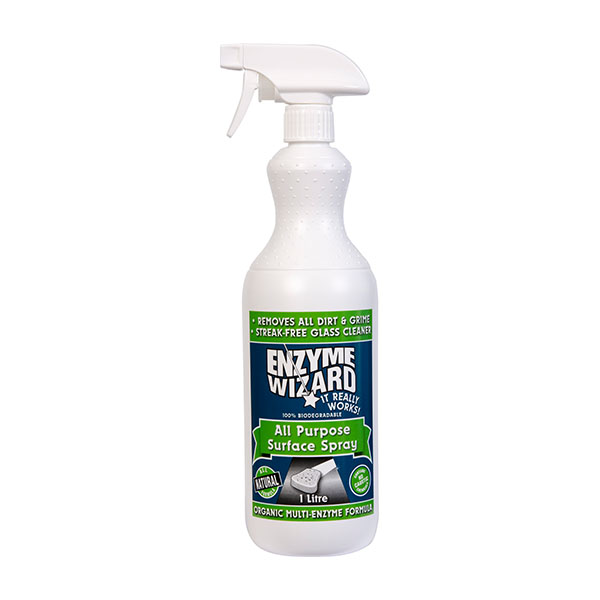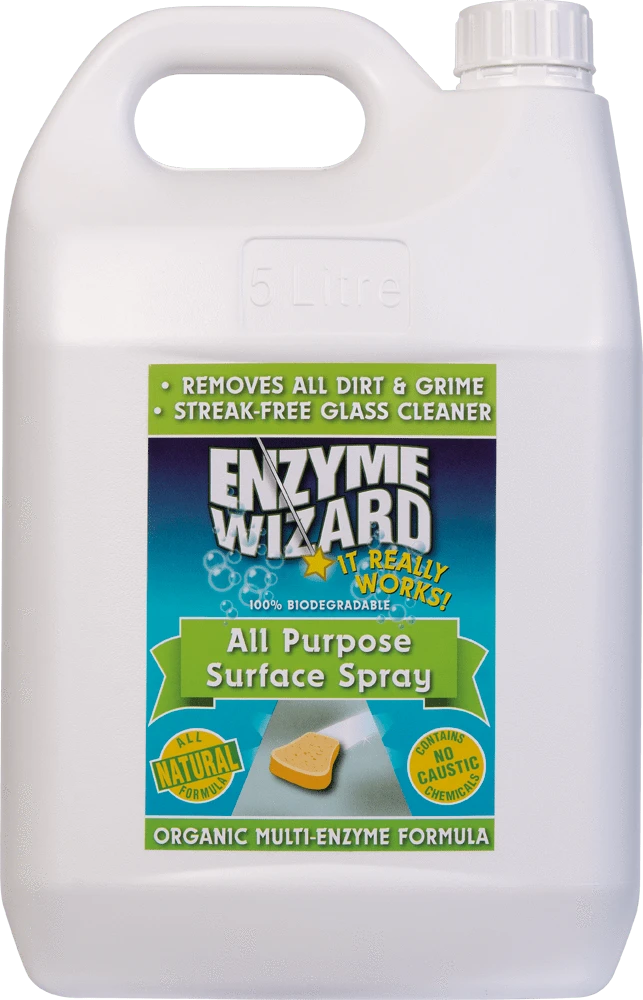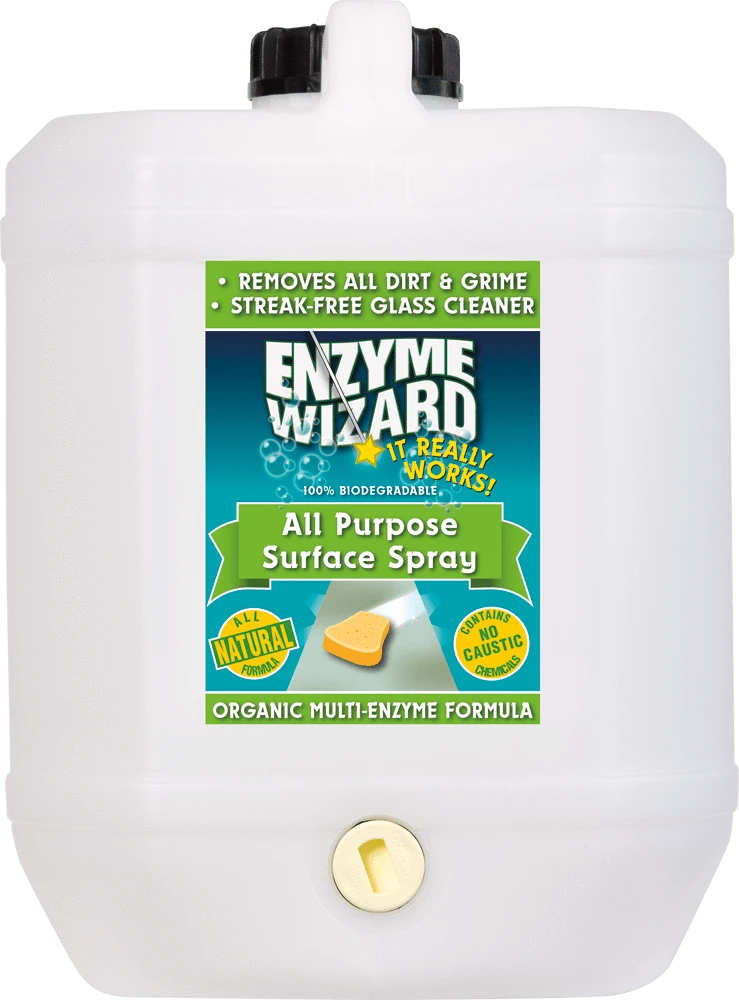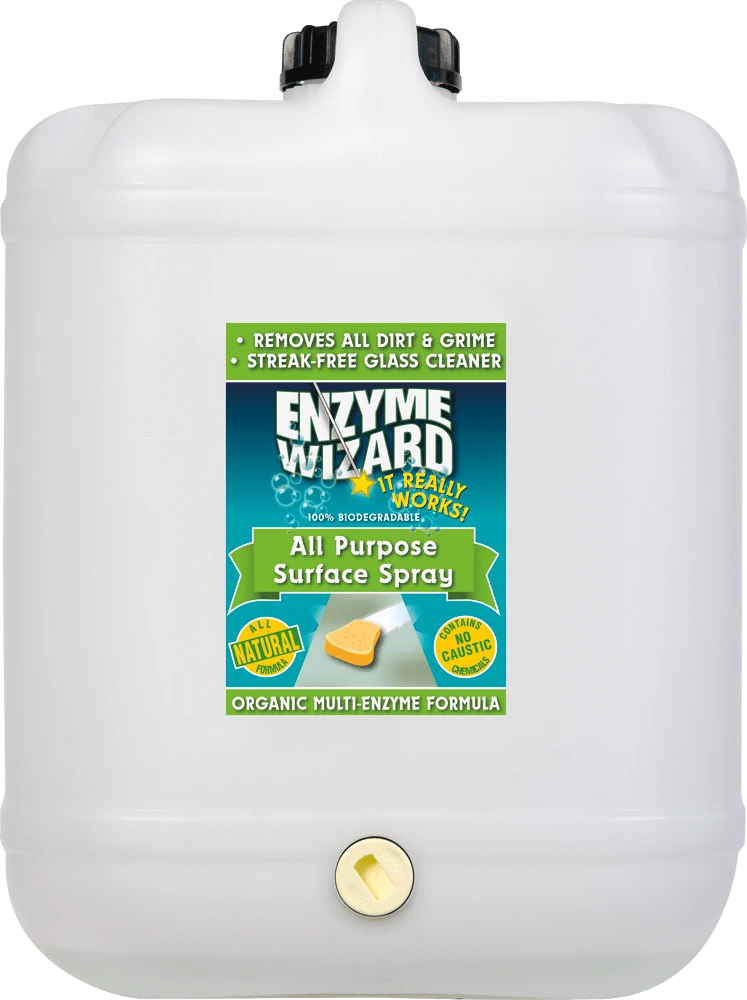Designed to break down organic, oily film and grime from all hard surfaces such as counter tops, cooking and food preparation areas, glass, range hoods, stainless steel, tiles, wooden bench tops, etc. Removes cigarette smoke stain, fingerprints, insect secretions. Road tar and coastal salt simply fall apart when the enzymes break down the organic bonds that hold them in place.
Enzyme Wizard is made in Australia
Enzyme Wizard’s Plant based multi-enzyme formula is designed to break down all organic waste matter including blood, grease, sweat, and urine. Soap-free, it leaves no residue, so will not attract dirt and grime and will not streak on any surface.
Concentrated: Spray should be diluted in the ratio of 10:1, unless tackling heavily soiled areas.
Safety: pH neutral, completely safe for children, pets, even when wet. Bio-degrades completely and so is totally safe for the environment.
The product is designed to discharge down the drain where the enzymes continue to attack built up waste in the pipes.
The enzymes eliminate biofilm (Please scroll to bottom for details)
Gentle for allergies, asthma and skin irritation
The unique formulation allows four separate plant-based enzymes to co-exist and digest organic matter. It deodorizes by attacking the organic source of the odour. Suitable for all hard surfaces.
Ideal for general cleaning, and in particular, food preparation areas and areas where pets have been present.
How to Use:
Do not mix Enzyme Wizard All Purpose Surface Spray with any bleach, oxidisers, or other chemicals as this will de-activate the enzymes.
It is recommended that when starting to use Enzyme Wizard All Purpose Surface Spray for general cleaning, new micro fibre cloths, brushes or other equipment should be used. This is because any residual soap, or chemicals will adversely impact the effectiveness of the enzymes and the non-smear finish.
For general cleaning, dilute Enzyme Wizard All Purpose Surface Spray at a ratio of 10:1 into the spray bottle. Spray the surface to be cleaned and wipe, preferably with a micro fibre cloth.
For areas with an excess build-up of grime, spray the surface with the diluted surface cleaner and use a soft brush and scrub down the surface. Leave the surface wet in order to give the enzymes longer to work.
To clean mirrors use one to two very light sprays of the diluted cleaning solution on to the mirror and then wipe down with a clean micro fibre cloth.
For badly soiled surfaces, Enzyme Wizard All Purpose Surface Spray should be diluted 50:50 with water. Spray the solution on to the affected surface and then scrub with a soft brush. It is important not to use a hard brush as the bristles of a hard brush will not be able to get down into every nook and cranny. This is especially important when cleaning tiled areas, as the grouting will be lower than the surface of the tile.
In hard to reach areas, such as under counters, or equipment, spray the surface cleaner on to the affected area over the course of two, or three days and wipe down as best as possible. The enzyme solution should soften the grime sufficiently to enable that area to be washed down with clean water.
What is Biofilm?
Bacteria have an automatic mechanism by which they adhere to surfaces and to each other. They form communities and secrete a defensive, protective layer around themselves called of biofilm. Behind this protective layer, they are able to feed and multiply.
Biofilm is a community of bacteria encased in extra-cellular polymeric substance (EPS), often referred to simply as slime. Biofilm can form on any hard surface and will build up over time. Disinfectants are unable to penetrate the biofilm and this allows pathogens to flourish leading to contamination. Many commercial environments struggle to break-down the biofilm, allowing contamination to occur on any type of surface, especially in food preparation areas, food production machinery, filters, and pipes.
The use of aggressive chemicals such as caustic soda and bleach have been traditionally used to try to eliminate biofilm, but they are not completely effective. They also corrode materials and machinery, endanger users, and negatively impact the environment.
Enzymes are a more efficient, safer and environmentally friendly option.
It is a two-step process:
First, a multi-enzyme cleaning / detergent procedure is implemented. The enzymes act specifically on the EPS that forms the structure of the biofilm allowing the detergent to remove the biofilm.
Second, a disinfectant is used that can now reach and kill all of the exposed bacteria.
Unfortunately, some organisations are reluctant to switch from their traditional cleaning methods to an enzymatic and environmentally safe solution. Their established cleaning procedures need not change fundamentally. This is because the two stage, enzymatic procedure will only be needed periodically to keep the biofilm under control.
*Please note SPECIAL ORDER refers to stock not held on hand but available for ordering in per supplier availability.




